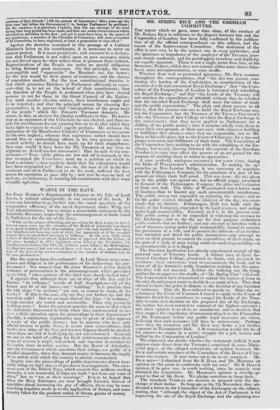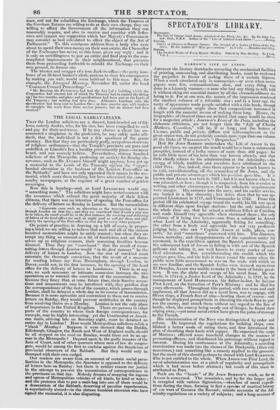MR. • SPRING RICE AND THE GRESHAM • COMMITTEE.
THE report which we gave, some time since, of the conduct of Mr. SPRING RICE in reference to the dispute between him and the
Corporation of London, has been fully confirmed by the publica- tion of all the official correspondence on this subject, and the report of the Improvement Committee. Our statement of the affair is now seen to be the correct one in every particular ; and the ignorance or impudence of the employer of the Treasury jour- nals stands confessed, and his pettifogging treachery and duplicity
are equally apparent. There is not a single letter from him, or his Secretary, BARING, which does not contain either some direct false- hood, some misrepresentation, or some shuffle.
Whether front real or pretended ignorance, Mr. Ries: assumes throughout the correspondence, that " the Act was passed, con- tinuing the burden of the Coal-duties, in consideration of the erection of a fit and convenient Royal Exchange ;" that " the Com- mittee of the Corporation of London is intrusted with rebuilding the Royal Exchange ;" and that " the Lords of the Treasury will not sanction the expenditure of 200,0001. without they be satisfied that the intended Royal Exchange shall meet the wants of trade
and the public expectations." The plain and short answer to all this is, that the persons who are to build the Royal Exchange are, not the Corporation, but the Trustees of Sir TilomAs GREsnAM'S will—the Trustees of that College of which the Royal Exchange is the endowment ; that they never applied to Parliament for a shilling of the public money • that it remains wholly with them to cover their own ground, at their own cost, with whatever building or buildings they please,—since they are responsible, not to. Mr. RicE or his colleagues, but to the Court of Chancery, for a due and proper execution and fulfilment of their trust. The Committee of the Corporation have nothing to do with the rebuilding of the Ex- change, but merely (having obtained the consent of the Gresham Trustees) to cstrry into effect the powers of an act passed for the purpose of enabling them to widen its approaches.
A case perfectly analogous occurred a few years since, during the Duke of WELLINGToN s administration. In snaking the ap- proaches to New London Bridge, it was necessary to negotiate with the Fishmongers Company for the purchase of a part of the ground on which their ball stood. This was clone : the site given up to the public was agreed on : but no official puppy presumed to demand of the Fishmongers Company the plans and estimates of their new hall. The Duke of WELLINGTON was a better man of business than to hazard any such unwarrantable interference. The public money was expended on widening the street ; and so far the public control, through the Minister of the day, was exer- cised—but no further. Fishmongers Hall was built with the funds of the Company, expended by its legal trustees, and acting under legal responsibility. Precisely so it is in the present case. The public money is to be expended in widening the avenues to the Exchange ; and so far the act for that purpose authorizes public control—but no further ; and any attempt to interfere with a set of trustees, acting under legal responsibility, bound to execute the provisions of a will, and to protect the interests of an institu- tion intended and fitted fir public instruction—any attempt to seize on their ground, to control the expenditure of their funds, on the part of a body of men acting under no such responsibility—is as unwarrantable as it is illegal.
The Gresham Institution has already experienced enough of the paternal care of Treasury Lords. A former race of theni de- stroyed Gresham College, plundered its funds, and pocketed its revenues : their successors want to consummate the work, and to leave of all its founder's noble foundation nothing but the name. But they will not succeed. Neither the bullying nor the lying, neither the swagger nor the shuffle, of "Mr. Spring That" will avail. The Corporation have determined to submit the matter at issue to the only fit and proper court to decide it—a court of law. They first offered to leave the point in dispute to the decision of any barrister of eminence. This Mr. Rice refused to accede to. Since the re- solution of the Court of Common Council to apply to the Court of Queen's Bench for a mandamus to compel the Lords of the Trea- sury to come to a decision on the proposed site of the Exchange, the matter has been referred to counsel of the highest eminence ; and their opinion is so clear, so unanimous, and so decided, that
°
they suggest the expediency Of of it to the Chancellor of the Exchequer before any public legal measures are taken, believing that such measures will then be unnecessary. Perhaps here they are mistaken, and Mr. RICE may desire a yet further exposure ill Westminster Hall, A fit termination would this be of his career—to expire iu a paltry struggle for a job, beaten and baffled by the Corporation of London!
We expressed our doubts whether the statement (which it now appears came direct from the Treasury) contained in some Minis- terial paper, of the alleged coincidence of opinion between Mr. Rice and certain members of the Committee of the House of Com- mons was correct. It now turns out to be as we surmised. Mr. Mess says—" I obtained from Sir B. HALL and Mr. Hettnirs an opinion on this point in conformity with my own." Sir B. opinion, if lee gave one, is worth nothing, since he scarcely ever attended the Committee. Mr. Heemes's opinion is directly op- posed to that of Mr. RICE. We pledge ourselves to these filets. The Gresham Trustees are anxious to proceed with the dis- charge of their duties. So long ago as the 7th November, they ad- dressed a letter to the Chancellor of the Exchequer on the subject, stating, that " although the object of the Act of Parliament is for improving the site of the Royal Exchange and the adjoining ave.
nues, and not for rebuilding the Exchange, which the Trustees of the Gresham Estates are willing to do at their own charge, they are willing to afford the Government all the information they can reasonably require, and also to receive and consider with defer- ence and respect any suggestion which her Majesty's Government may consider as best calculated to effbct the object of the Act of Parliament." To this courteous address from a body who were about to spend their own money on their own estate, the Chancellor of the Exchequer has never, to this hour, given any reply : and it is only an unwillingness to put an entire and final stop to the con- templated improvements in their neighbourhood, that prevents them from proceeding krthwith to rebuild the Exchange on their own ground, its former site. The bluster and swagger ofa true Jack-in-office—the petty inso- lence of an ill-bred banker's clerk, anxious to show his consequence by making you wait, would seem habitual to this man. See, for example, the Liverpool Mercury, November 23, under the head "Common Council Proceedings"—
" Mr. &wring, the Postmaster, had had the key [of a building which the Corporation Lad erected, hut of which the Treasury had to control the fitting up] for two months, and plans and specifications had been sent to the Lords of the Treasury ; but nothing had been done. Alderman Leath= said, the specification had been sent to London three or four months ago, with tenders to complete the work from three master joiners; but no answer had been received."



























 Previous page
Previous page